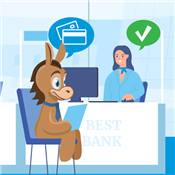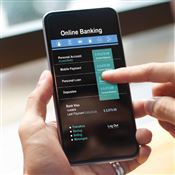How Old Do You Have to Be to Open a Bank Account
Ad Disclosure: This article contains references to products from our partners. We may receive compensation if you apply or shop through links in our content. This compensation may impact how and where products appear on this site. You help support CreditDonkey by using our links.
Learn the minimum age to open a bank account and the many different types of account options available to individuals under 18 years old.
 |
Looking to open a bank account for a minor? Or maybe you're 16 and just got an after-school job?
You have more bank account options than you realize.
In this article, find out what they are if you're under 18. Plus, discover tax considerations and other information to help you in this endeavor.
How Old Do You Need To Be To Open A Bank Account?
 |
In the United States, you generally must be 18 years old or be in the Age of Majority to open a bank account on your own.
While the Age of Majority in most states is 18, it is 19 in Alabama[1] and Nebraska[2] and 21 in Mississippi[3].
Although it's higher in those states, it does not necessarily apply across the board. For example, according to Mississippi Code § 93-19-13, all persons 18 years or older have the ability to enter into legal contracts regarding personal property ownership.[4]
However, it's always a good idea to check with your bank to find out the minimum age to open an account.
You have to be at least 18 years old to open a bank account on your own in most states. And the best bank for 18 year olds is a good read to start exploring your options. If you're 16 or younger, you'll need to open a joint account (or similar account) with a parent or guardian.
What age should a child have a bank account?
For minors, there is no specific age for them to possess a bank account. It all depends on their needs and circumstances. After all, it's the parent or guardian who will manage the account at the very least for the time being.
Some may start as soon as they are introduced to the concept of money and saving, which is around 5 to 8 years old. Or, according to the Consumer Financial Protection Bureau (CFPB), if their piggy bank is no longer enough to hold their savings,[5] perhaps some of which are from monetary gifts or rewards.
Nonetheless, here are general recommendations based on several expert opinions and common practices:
0 to 5 years old: Custodial accounts
6-12 years old: Joint savings accounts
13-15 years old: Teen savings or checking accounts
More details on the above accounts later.
What are the benefits of a child bank account?
Opening a bank account for your child offers these advantages:
- Early financial literacy
Research conducted at the University of Kansas found that having a savings account as a child leads to better financial outcomes later in life.[6] - Saving for the future
According to the 14th Annual Parents, Kids & Money Survey in 2022, 39% of surveyed kids manage a savings account compared to those who keep their money in a piggy bank (29%).[7] - Interest income
Earning interest from your child's savings can be a practical lesson for compound interest benefits, motivating them to save more. - Build financial history
Starting early can be beneficial when they need to open other accounts or secure loans when they become an adult. - Parental oversight
Thanks to digital innovations, you can monitor a teen checking account using an app and ensure your child makes smart financial decisions.
What Kind Of Bank Account Can I Open For My Child?
 |
Since kids cannot generally open a bank account on their own, here are several banking options for them:
Custodial Accounts
These are savings or investment accounts set up for the benefit of a minor by an adult (the "custodian") that legally transfers ownership to the minor on the day they reach the Age of Majority.
There are two types of custodian accounts: Uniform Transfer to Minors Act accounts (UTMA) and Uniform Gift to Minors Act accounts (UGMA).
Only financial assets like cash, stocks, and bonds can be invested into a UGMA account. UTMA accounts allow for other types of valuable assets like real estate and artwork.
Pros
- Easy to set up
- No contribution limits
- No withdrawal penalties
- More investing options than a savings account
- Automatically transfers to the minor once they reach Age of Majority
Cons
- No debit card for the minor
- May count against financial aid eligibility for college
- Gifts and deposits made are irrevocable
Both custodial and joint accounts can be opened for a child at any age, which may require their Social Security number (SSN). The easiest and fastest way to receive your child's SSN is to apply when you give information for the birth certificate at the hospital.[8]
Joint Accounts
If you're looking to teach your child how banking works, such as making deposits, using a debit card, and withdrawing cash from the ATM — a joint account is your best bet.
Joint accounts are standard bank accounts with two or more owners. They are common for married couples and business partners, as well as parents and their children.
You can monitor all transactions conveniently using an online access or mobile app. Some banking apps also offer educational tools designed for children which can enhance their money management skills.
Pros
- Works like a regular bank account
- Typically no fees and may earn interest
- Online banking and mobile access
- FDIC insured up to $250,000
Cons
- Parent is responsible for the financial activities of the minor (including overdrafts)
The next 2 are specific types of joint accounts.
Savings Accounts
Since a kid cannot open an account on their own, you as their parent or guardian will do it for them.
A joint savings account usually offers interest (albeit minimal), which can help a child learn how their money grows in a bank instead of just them putting it in a piggy bank.
Many banks offer savings accounts for kid with low or no fees, making them accessible for families.
Pros
- Develops saving habits
- No minimum age
- More secure way than storing cash
- Earns interest
Cons
- Negligible interest earnings
- Withdrawal limits
Checking Accounts
A checking account can provide valuable lessons in money management and financial responsibility. It teaches your child about budgeting, tracking expenses, and managing their funds in real time.
Some banks offer joint checking accounts for teenagers around 13 to 15 years old. It comes with a debit card that allows them to make purchases and withdraw cash from ATMs.
Parents can set spending limits, receive transaction notifications, and monitor account activity to ensure responsible usage.
Pros
- Teaches money management
- Provides practical experience
- Parental controls
- Safer money transactions
Cons
- Potential fees and minimum balance requirements
- Impulse buying/ overspending
- No interest
Kids under 18 can learn a lot about responsible spending and saving with a checking account. Check out the top checking accounts for kids and teens to give your child a head start.
Chase High School Checking℠ - $125 Bonus
- Your teen gets $125 when you open a new Chase High School Checking℠ account together with qualifying activities within 60 days of coupon enrollment
- As a co-owner of the account, you must be present at account opening.
- $0 Monthly Service Fee
- Help your teen build good money habits with their own debit card. Plus, they can add their debit card to their digital wallet.
- With Zelle®, pay and get paid back from friends and family who have an eligible account at a participating U.S. bank. No fees and no waiting for days for money to hit their account.
- You and your teen can stay on top of their account activity by choosing which Account Alerts you both want to sign up for — such as low balance, posted payments, and more.
- Chase makes it easy for your teen to access their money from anywhere with the Chase Mobile® app, plus thousands of ATMs and branches.
- JPMorgan Chase Bank, N.A. Member FDIC
First Checking - 0.10% APY
- Joint checking account for 13-17 year olds
- No fees
- Up to $12 domestic ATM fee reimbursements per month
Prepaid Cards
Prepaid cards almost always charge monthly or annual fees and are not recommended for adults. However, many companies like Greenlight and FamZoo offer prepaid cards along with financial education tools tailored for kids and teens.
Pros
- Keeps spending in check
- Cannot be overdrawn
- Offers educational tools for financial literacy
- Easy to cancel at any time
Cons
- High fees
- No interest earned
- Usually no ATM network
Acorns Early Kids' Debit Card
- Real-time spend notifications.
- Block and unblock cards easily.
- Teach financial independence safely.
All Ages - Banking and Invest in One App
- Flexible controls, spending notifications, in-app chore list
- Age: No minimum age
- Fees: Starts at $5.99/month, per family (up to 5 kids). $10.98/month for Greenlight Max. $15.98/month for Greenlight Infinity. $24.98/month for Greenlight Family Shield.
First Checking - 0.10% APY
- Joint checking account for 13-17 year olds
- No fees
- Up to $12 domestic ATM fee reimbursements per month
Legal Emancipation
In rare circumstances, a teenage minor may file for legal emancipation. This is a process where they gain independence from their parents or guardians, giving them adult status for many legal purposes.
If approved in a court of law, they can make decisions and sign contracts without needing additional approval from their parents. This usually includes opening a regular bank account.
How to open a bank account under 18
 |
If you find the bank or financial institution that's right for you or your child, here is how to sign up.
- First, gather all necessary documents.
These include a photo ID card, your SSN (or taxpayer identification number), and proof of address (such as a utility bill or driver's license).If you're signing up for a joint or custodial account, you will need the identifying information of both parties.
- Then, visit a branch, call, or sign up online.
Ask to sign up for the account of your choice. Thereafter, you'll be directed to enter your information and agree to the terms and conditions of account opening.If this is a joint account, the parent must sign legal papers for the minor.
- Finally, make your opening deposit.
Make sure you have enough money to cover the minimum opening deposit and balance requirements.
Do minors owe taxes on an interest-earning account?
Single dependents (including minors) are required to file a tax return for unearned income more than $1,100, unless the parent chooses to include their child's interest income on their tax return.
However, this is an unlikely scenario. Earning $1,100 in interest payments in a single year would require an average balance of $110,000 and an interest rate of 1.00% or higher — which is extremely rare in today's near-zero interest rate environment.
Educational Savings Accounts For Minors
 |
Another option for parents is to open an educational savings account. This can alleviate the burden of student loans while offering many tax advantages.
The two main types of educational savings accounts are 529 Plans and the Coverdell Education Savings Account (ESA).
Coverdell ESA
Sponsored by the Federal government, Coverdell ESAs are trust or custodial accounts that can be used for educational expenses such as books, tuition, computers, supplies, and even transportation. Funds can be used to pay for K-12 and higher education expenses.[10]
Contributions are made with after-tax dollars into investment vehicles like stocks, bonds, ETFs, and mutual funds. Growth and withdrawals are both tax-free (similar to a Roth IRA).
However, these are some limitations of the Coverdell ESA:
- Contributions limited to $2,000 per beneficiary per year.
- No contributions can be made after the beneficiary turns 18.
- Based on the prior two limitations, the maximum effective total value is only $36,000 per beneficiary.
- You must make under $110,000 per year to make contributions ($220,000 if filing jointly).
- Contributions are not tax deductible.
529 Plans
529 Plans are sponsored by state governments. It's important to note that you do NOT have to live in a certain state to participate in that state's 529 Plan. For example, a New York resident can get an Arizona-sponsored 529 Plan.
529 Plans were originally only for higher education expenses. They are now available for K-12 expenses and some apprenticeship programs.
Like a Coverdell ESA, contributions are made with after-tax dollars and withdrawals are tax-free assuming they are used for educational expenses.
529s are much more flexible than Coverdell ESA plans. Other advantages include:
- No contribution limits (though only $15,000 per year is excluded from the gift tax).
- Can be used to pay off student loans, which Coverdell ESA funds cannot.
- No income limits.
- No age limits (can keep contributing after the beneficiary turns 18).
Nine state 529 Plans offer "tax parity," meaning that contributions can be subtracted from your annual income for tax purposes. These are Arizona, Arkansas, Kansas, Maine, Minnesota, Missouri, Montana, Ohio, and Pennsylvania. Remember, you don't have to live in these states to participate in their 529 Plan.[11]
How To Choose A Joint or Custodial Account With Your Child
If you're thinking of opening a custodial or joint checking or savings account with your kid, here's a quick guide:
| What to look for | What to avoid |
|---|---|
| Good interest rate (if offered) | High monthly service fees |
| FDIC or NCUA insurance | Large opening deposit requirement |
| Low fees, if at all | High overdraft fees |
| Helpful, user-friendly app | Banks with neglected websites |
| Good customer service record | Mixed/poor customer reviews |
| Educational tools | No ATM access (for a checking account) |
Let's get into the details.
Type of Institution
- Traditional Bank: Traditional banks offer name recognition and convenience. Plus, it's easy to find a local branch and speak with a banker in person if issues arise. However, their accounts tend to charge fees and have few rewards.
Example: Bank of America
- Digital Bank: These online banking institutions reduce expenses by eliminating the need for brick-and-mortar locations. While they don't have physical branches, they usually offer no fees, high savings rates, and nationwide ATM networks.
Example: Axos Bank
- Credit Union: As a nonprofit, member-owned financial institution, a credit union offers the same services as traditional banks. But, they usually boast better service, improved savings and loan rates, and a warmer, more communal vibe.
Example: PenFed Credit Union
Fees
After you've selected the type of institution you want to bank with, the next thing to do is to find a specific bank or credit union that offers low fees.
Keep an eye on monthly service fees, ATM surcharges, overdraft fees, and minimum balance fees.
APY
You shouldn't pay a bank to keep your money — they should pay you. Choose a bank that offers a decent APY on account balances for savings and/or checking accounts.
This can also help teach your child about compound interest, which is a key feature of saving for retirement.
ATM Access
If you want your child to gain experience withdrawing cash from the ATM (and learn that it's not the infinite money machine), check your access to nearby fee-free ATMs.
For traditional banks, you'll need to make sure there are branches in your area.
Digital banks usually participate in interbank ATM networks like MoneyPass or Allpoint which can be easy to find.
If you choose a credit union, ATMs may be available at their local branches. In any case, many credit unions also participate in Co-op, a distributed ATM network that includes 1,969 credit unions nationwide.[12]
Bottom Line
The minimum age to open a bank account alone is 18 in most states. But minors can still own a bank account with the help of their parent or guardian.
Opening a custodial or joint account can be a great way for them to learn financial responsibility and smart money habits. This can prepare them for managing a regular bank account in the future.
References
- ^ Alabama ABLE. Are There Age Restrictions to Open an Account?, Retrieved 7/09/2024
- ^ Nebraska Department of Education. Reaching The Age of Majority, Retrieved 7/09/2024
- ^ Mississippi Department of Human Services. Understanding Child Support: A Handbook for Parents, Retrieved 7/09/2024
- ^ Justia US Law. Removal Of Disability Of Minority, Retrieved 07/23/2024
- ^ Consumer Financial Protection Bureau. When's a Good Age to Open a Savings Account for my Child?, Retrieved 7/08/2024
- ^ University of Kansas. Savings Accounts For Children Linked With Later Financial Success, Retrieved 7/08/2024
- ^ T. Rowe Price®. Detailed Results: 14th Annual Parents, Kids & Money Survey, Retrieved 7/08/2024
- ^ SSA.gov. Social Security Numbers for Children, Retrieved 07/23/2024
- ^ Judicial Branch of California. Emancipation in California, Retrieved 7/09/2024
- ^ IRS.gov. Coverdell Education Savings Accounts, Retrieved 07/23/2024
- ^ Morningstar. 529 State Tax Benefits in 2024, Retrieved 07/23/2024
- ^ Co-op. Co-op ATM Network, Retrieved 7/09/2024
Write to Justin Barnard at feedback@creditdonkey.com. Follow us on Twitter and Facebook for our latest posts.
Note: This website is made possible through financial relationships with some of the products and services mentioned on this site. We may receive compensation if you shop through links in our content. You do not have to use our links, but you help support CreditDonkey if you do.
|
|
|









